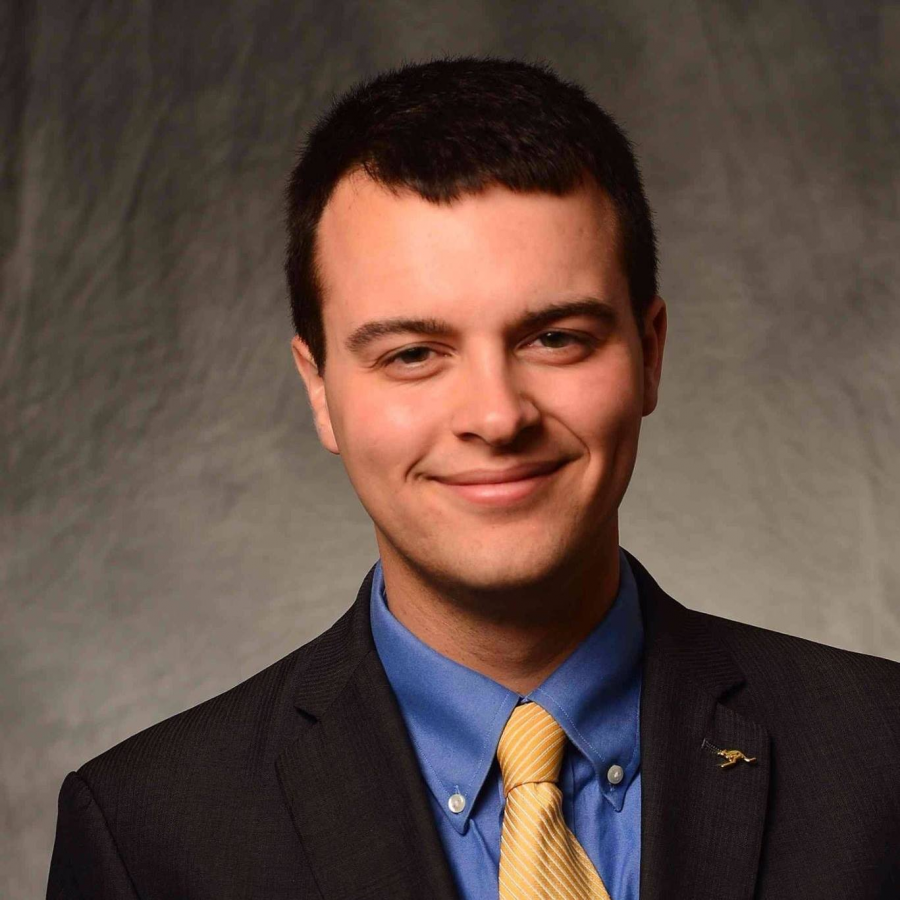USG President Discusses Support for APR, Student Reactions to Results
Undergraduate Student Government President Taylor Bennington goes into detail about the role he played in the Faculty Senate, representing and reaching out to the student body.
Taylor Bennington, President of the UA student body and Undergraduate Student Government. (Photo courtesy of The University of Akron)
October 9, 2018
During an exclusive interview with The Buchtelite, Taylor Bennington, President of Undergraduate Student Government at The University of Akron, explained why USG supported the Academic Program Review and his understanding of students’ opinion toward the results.
As representatives of USG and the student body in the Faculty Senate, Bennington and Vice President Andrew Barry were involved with the APR when it began going through the Faculty Senate.
Bennington said the extent of his involvement in the APR process had been sharing information between Interim President Dr. John Green and student leaders, specifically “what was going on with program review and to solicit feedback: not about specific programs, but about the process.”
Meanwhile, Bennington also said he was involved through the Faculty Senate in voting to approve the APR report before it was sent to Green and other administrative figures, as the Faculty Senate had been the ones guiding the process for the APR.
“The Faculty Senate approved of the original document,” Bennington said. “I was there, I voted for that original document that got sent to the administration knowing full well that document could be used to… make decisions pertaining to programs.”
During the interview, Bennington said that the decision to cut 80 programs had been a difficult one for administrative figures, but was “indicative of the student opinion” and necessary for the future of the University.
“If you look at the programs that are being phased out, the students spoke themselves inherently in making those decisions. Ninety-five percent of students weren’t in those 20 percent of programs that are being phased out,” Bennington said.
Meanwhile, Bennington also said that USG made no attempts to reach out to any students through any methods, such as a survey, about their thoughts toward which programs should be cut before the decisions had been made.
After the Board of Trustees listed the 80 programs planned to be phased out, Bennington said he let students know that they could talk with him about the process and results, but still has not actively sought out to talk with the five percent of students affected.
“Preliminarily there was no survey, I suppose, to say. But after the fact we made several opportunities available for students to engage with us about academic program review and I’ve been involved in many many conversations with student leaders after the fact,” Bennington said.
One instance when Bennington had spoken with students after the cut programs were decided was at a student leader lunch where select student leaders were chosen to meet with Green and ask any questions they had pertaining to the University.
“We were really intentional about the first meeting who we were inviting to the table. We invited the president of the engineering student council to be part of that conversation because we know that… there was some debate about some of the changes proposed,” Bennington said.
Although Green went into great detail about the APR during this lunch, Bennington said he could not recall any questions specifically being raised in regards to the APR.
“I don’t remember any questions being asked, but we’ll be generous and say at most there was one to two questions asked about academic program review,” Bennington said. “Most students don’t care because it doesn’t impact them.”
While tabling in various locations on campus and talking with different students about their concerns at UA, Bennington said he does not ever hear students say the APR is a part of their concerns.
“I’ve been out multiple times asking and talking to students about, you know, ‘hey what are you most concerned about on our campus?’ Nobody’s saying academic program review. It’s not something that’s a concern to the student body.” Bennington said.
With the feedback regarding the APR and its results he has received from students, Bennington said that none has involved negative reactions.
Using the example of when students protested outside of Buchtel Hall during the Scarborough Administration, Bennington said he feels that students would be vocal if they did have concerns.
“I’d say that our student body’s history is one that students really don’t hold back when they have concerns,” Bennington said.
Students may not be protesting in front of Buchtel Hall as others have in the past, but they are sharing their opinions elsewhere.
A large whiteboard in Bierce Library asked students what they have learned so far this semester. One of the responses read: “That UA wants to cut research programs for more funding for sports.”

A whiteboard in Bierce Library where students are encouraged to write what they have learned so far this semester.
Nonetheless, Bennington said that he is confident that the process was done “in the good spirit of shared governance, and my confidence in the administration’s commitment to hearing the student voice.”
Pertaining to shared governance, the student voice did not have the same magnitude and power as other groups had when evaluating the APR.
Bennington said that the APR was an academic issue, which the Faculty Senate exclusively handles. Although Bennington represents things that are important or concerning to the student body in the Faculty Senate, he said USG doesn’t have a role in discussing academic issues.
“What I think is important to know about shared governance is that ultimately, at the end of the day, the administration are the ones that the board has entrusted with immediate decision making power,” Bennington said.
Concluding the interview, Bennington repeated his previous statements of support for the APR and that he felt strongly about this process being completed with ideals of shared governance and commitment to understanding students’ voices.












